Jeff Garrison
Bluemont and Mayberry Presbyterian Church
December 12, 2021
Third Sunday of Advent
Luke 3:7-20
At the beginning of worship
We’re at the third week of Advent. Christmas is coming. Have you’ve been naughty or nice? Of course, that sounds like I’m emphasizing works. We often think the only thing that matters is a belief in Jesus. And while believing in Jesus is important, so is how we live our lives. Because of the love we’ve experienced in Jesus Christ, we are to share such love with others.
This week on Twitter, a seminary student witnessing an online debate over what’s the correct belief, responded: “Some of y’all need to stop studying apologetics (that’s the defense of our faith) and start studying apologies.”[1] She has a point. Jesus would probably agree.
I’ve been reading Makoto Fujimura new book, Art and Faith: A Theology of Making. The author challenges us at our “bottom line”.[2]What are we doing with our lives? How are we using the gifts God has given us to make this world a better place? Not only do we need to believe and love Jesus, but we must also shape our lives using him as a model.
Before the Gospel Reading
Again, this week, we’re dealing with John the Baptist. The man preaches a harsh sermon. God’s judgment is at hand! John’s message when added to Zephaniah’s (whom we heard in our Old Testament reading) blend into the sweet and sour of God’s word. Like sweet and sour sauce, the richness of tastes comes by combining both flavors. God’s ways are good for salvation, yet they are linked to judgment. Listen to what John says. Once he gets your attention, I think you’ll then be surprised at what he says.
After the Reading of the Gospel
The Hound of Heaven
Francis Thompson depicted Jesus as the Hound of Heaven in his epic poem by the same name… We, of course, are the ones portrayed in the poem as being chased by the hound. Out of fear, we run as fast as we can.
I fled Him, down the nights and down the days;
I fled Him, down the arches of the years;
I fled Him, down the labyrinthine ways
Of my own mind; and in the mist of tears
I hid from Him…
But the hound pursues. He doesn’t give up the chase. When he finally overtakes us, we find it’s the not the deranged dog we’ve feared.[3]Jesus is a loving hound, who chases us down because he cares about us. The Hound of Heaven is the type of dog that would jump all over us and lick us.
At the risk of blasphemy, the hound of heaven is like my dog, Mia. As those of you who have met her knows, she barks and barks, but if you get to know her, she’s loving. She’ll roll over and let you rub her belly.
The Junkyard Dog
But if Jesus is the loving hound of heaven, John the Baptist is the junkyard dog.[4] Wild and furious, John stands in our way. Interestingly, in all four gospels, before we get to the life of Jesus, we go through John. We endure John’s preaching and hear about the vipers, wrath, and unquenchable fire.
We want to get to the stable, where we feel safe and can see baby Jesus lying in a manger. We want to bring gifts for the child, to sit at the feet of a gentle Savior and draw in his words. But before we arrive, we must deal with this wild lunatic. The junkyard dog snaps at our heels, shouting repent, repent, for judgment is at hand.
John wasn’t a preacher who spoke gently. He had no golden tongue or mild-manner ways. When the crowds came, he shouted at them, “You brood of vipers.” That’s not a line church growth consultants suggest we preachers use. Yet, they came. People came from all around. Somehow the word got out and people were intrigued, and they made their way to where John was holding his camp meeting. Why, what drew them? Perhaps they needed an honest assessment of themselves. Or, more likely, they knew what John said was true, that deep down they were lost and to find the way to salvation, they had to be honest to themselves and to God.
The Need to Confront Our Sin
Consider this: If we think things are okay, we have no need for a Savior. But when things aren’t looking quite right, when we’re in over our heads, we need a Savior. John prepares these folks for Jesus’ arrival, getting them to understanding that just being children of Abraham isn’t enough, they need something more. It’s no longer the “good old boy system” where you get special treatment because your daddy or uncle is so and so.
The Grace in John’s Message
Although John has some rather unusual tactics and he preaches judgment as harsh as any fire and brimstone Puritan, his message really isn’t that tough. He gets the crowd’s attention by harshly pointing out their sin and teaching that they couldn’t depend on the faith of their ancestors. Once he’s got their attention, John demands they behave in a particular way. By then, they know they have not been living up to God standards for John doesn’t command anything that’s not set out in the law.
What Should We Do
What John does is to get his audience’s attention, convict them of their sins, and lead them to the point that they ask, “What should we do?” This question forms the centerpiece of this passage about John’s ministry. What should we do? It’s asked three times in these few verses!
First the crowd asks the question. “What should we do?” And John says, “Be generous.” Share what you have.
Next, tax collectors come and ask what to do. Did you catch Luke’s irony? In the New Revised Standard version, the phrase reads, “even tax collectors came.” No one expects them, but they came and asked what they should do. John tells them to only collect what they are supposed to collect.
Luke sets the stage here for an event that will come later. In the 19thchapter, he’ll tells us the story of Zacchaeus, the wee-little tax-collector who meets Jesus and doesn’t have to ask what to do.[5] Instead, he gives half his possessions away and promises to give to those he defrauded four times what he’d taken. Had Zacchaeus heard John’s sermon?
Perhaps more surprisingly than the tax collectors are the soldiers who make their way to John’s revival meeting. These soldiers would not have been welcomed by the Jews of the day, for they were serving Imperial Rome.[6]
Remain Moral in Compromising Occupations
Surprisingly, John doesn’t say the tax collectors or soldiers should find a more suitable occupation. Tax collectors can still collect taxes and soldiers can still do their duty. However, they are encouraged to be generous, honest, good, and content. In other words, they’re to be nice. John’s teaching assumes that even in potentially compromising situations, people can still be moral.[7]
Nothing Radical About John, Mostly Mundane
There’s nothing radical about what’s John calls people to do! As one scholar on this passage wrote, “Much of what it means to follow Christ into better ways of living seems so mundane.” He goes on to note that mundane comes from the Latin word for world, and suggests that John 3:16 could also be translated as “God loves the mundane that sent his Son.”[8] Being a disciple isn’t about making a being on a grandstand, it’s what we do in the mundane encounters of life.
John comes to prepare the way and because of his message people expect something great to happen. The greater the demands, the greater the expectation. As the church, we need to remember that. The people of Israel now expect great things; after John, they are ready for Jesus. But are we? Ponder that question…
Those Not Wanting to Hear John
Of course, there are those who don’t want to hear John’s message. There are always those who don’t want to play nice. One is Herod, the puppet ruler for Rome, who is one of history’s rotten characters. Herod can’t stand the truth. In a classic example of shooting the messenger, he has John jailed and later beheaded. But it was too late, John has already spoken, the Savior is on his way, and soon Herod will only exist as a footnote in history.
John Challenges the Chosen
It’s interesting to me that John can pull off his message. After all he preaches to the chosen people, those who feel God’s hand-picked them to be special. He’s telling those who feel secure because they have a covenant with God to shape up. Some of us may feel this way. Yet, we should know God expects more of those who have been given more.[9]
Will Rogers, America’s John the Baptist
Will Rogers may be the closest thing we’ve had in America to John the Baptist. Rogers didn’t pull any punches when attacking “sacred cows.” Like John, Rogers challenged society to live up the values they espouse and to change oneself before changing others. Pointing out the inconsistency in this nation of Christians, he once asked:
What degree of egotism is it that makes a nation, or a religious organization think theirs is the very thing for the Chinese or the Zulus? Why, we can’t even Christianize our legislators!
On another occasion he said that we have “the missionary business turned around. We’re the ones that need converting.”[10]
We Need to be Converted
Rogers has a point. We need to be converted, and now is the time. Before we head off to Bethlehem, we need to realize our need for a Savior. Before we enter the stable, we need to get our act together so we can anticipate what our God can do for us as opposed to what it is we can do for ourselves. We need to be shaken out of our comfort zones, to be confronted by John’s wrath, so that we too will seek out and clean up those places in our lives that are inconsistent with the gospel.
As harsh as we might think John came across, his preaching wasn’t void of good news. Yes, John points to the ax at the tree not bearing fruit and he talks about the fire burning the chaff. But trees that have been pruned bear more fruit and though the chaff is burned, the kernels of wheat are saved. John’s message encourages the Israelites (and us) to bare more fruit. And to be fruitful, we must put away those obstacles, those sins, which keep us from having a healthy relationship with God.
Conclusion
Before rushing off to the manger to worship the Christ Child, pause long enough to hear John’s warning. His bark may sound mean, but it’s a loving warning. Repent and prepare a place in your hearts to receive the Messiah. Live so that your faith in a loving Savior is shown in a gentle life that is lived honestly and filled with kindness. Amen
[1]Laura Klenda, on Twitter, 9 December 2021
[2]Makoto Fujimura, Art and Faith: A Theology of Making (New Haven, CT: Yale, 2021), 62.
[3] Francis Thompson, The Hound of Heaven (Harrisburg, PA: Morehouse Publishing, nd).
[4] Idea from a sermon titled “A Cure for Despair” where John was portrayed as a Doberman pinscher. See Barbara Brown Taylor, God in Pain: Sermons on Suffering (Nashville: Abingdon, 1998), 22ff.
[5] Luke 19:1-10
[6]James R. Edwards, The Gospel According to Luke (Grand Rapids, MI: Eerdmans, 2015), 112.
[7] Edwards, 113.
[8] Scott Hoezee, “Remembering the Future” in Reformed Worship #57 (September 2000), 9.
[9] Luke 12:48.
[10] The Best of Will Rogers, Bryan Sterling, editor (New York: MJF Books, 1979), 194.
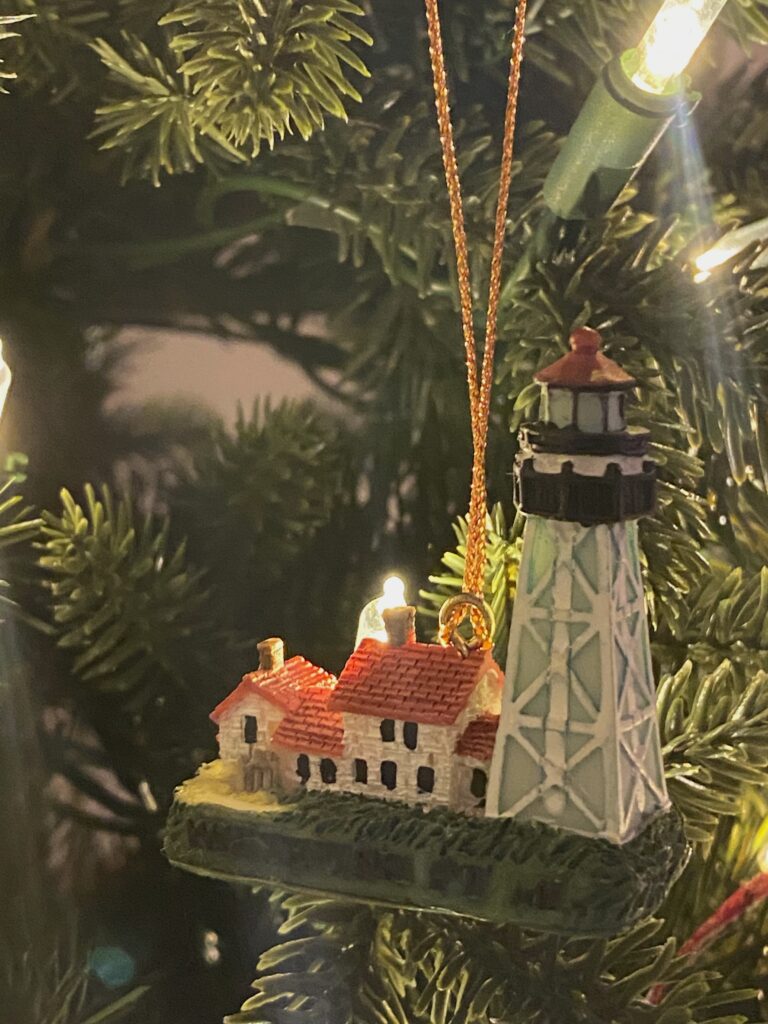

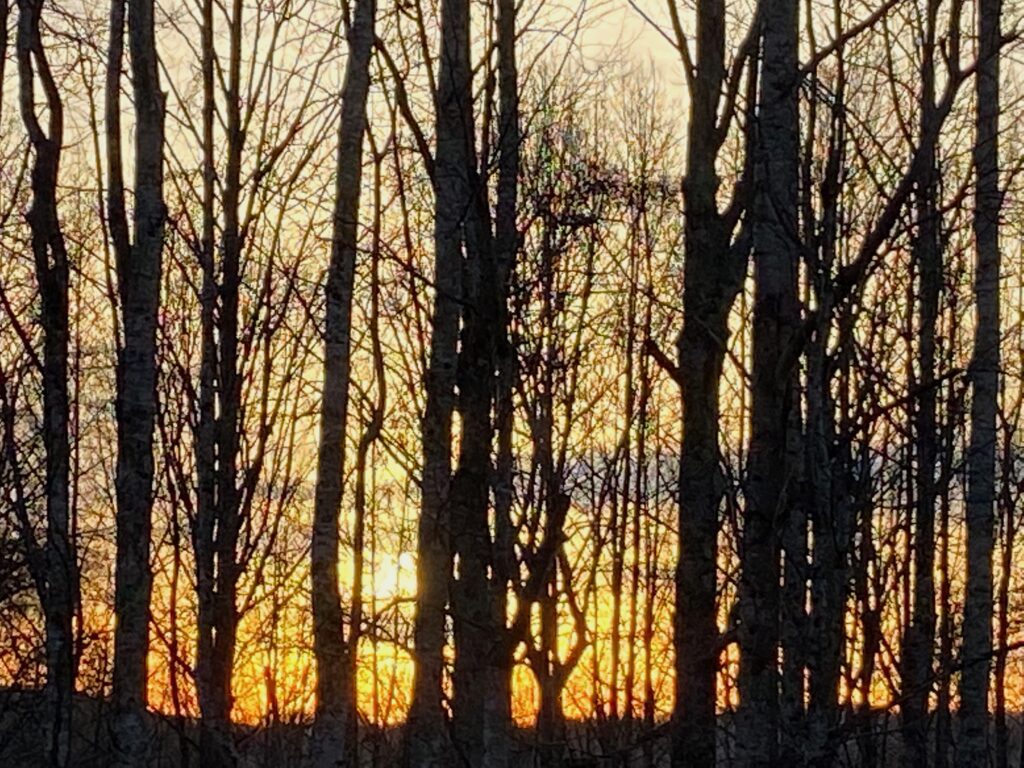

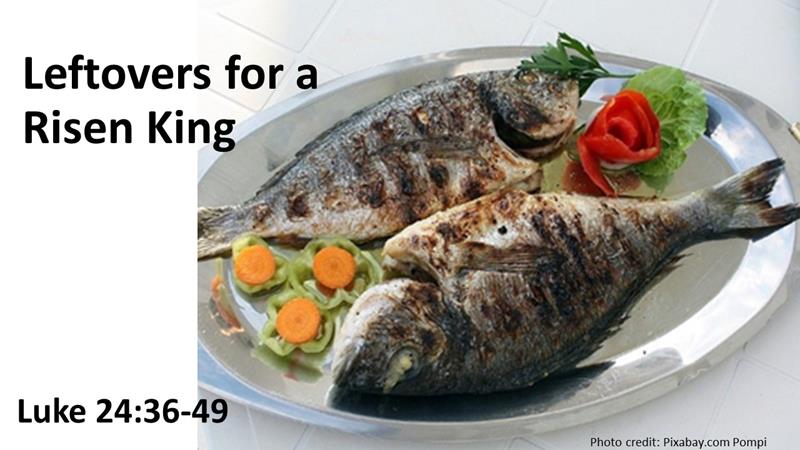 Jeff Garrison
Jeff Garrison

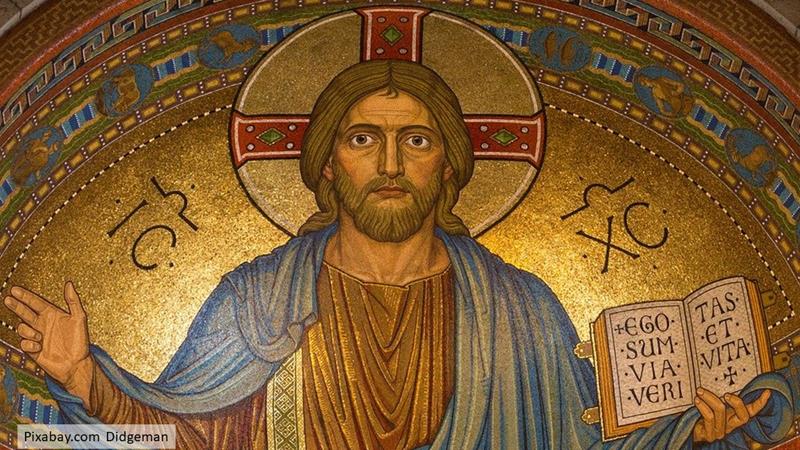 One of the common characteristics of the post-resurrection appearances of Jesus is that no one is looking for him, and no one “finds him.” Instead, Jesus just shows up. The disciples are hearing from the women about Jesus not being in the tomb, reports of him being in Emmaus, and from Simon Peter. But they don’t send out a search party to find Jesus. They’re scared. They lock themselves into a room while discussing what they consider as rumors. And when Jesus mysteriously shows up, they freak out. “It’s a ghost!”
One of the common characteristics of the post-resurrection appearances of Jesus is that no one is looking for him, and no one “finds him.” Instead, Jesus just shows up. The disciples are hearing from the women about Jesus not being in the tomb, reports of him being in Emmaus, and from Simon Peter. But they don’t send out a search party to find Jesus. They’re scared. They lock themselves into a room while discussing what they consider as rumors. And when Jesus mysteriously shows up, they freak out. “It’s a ghost!”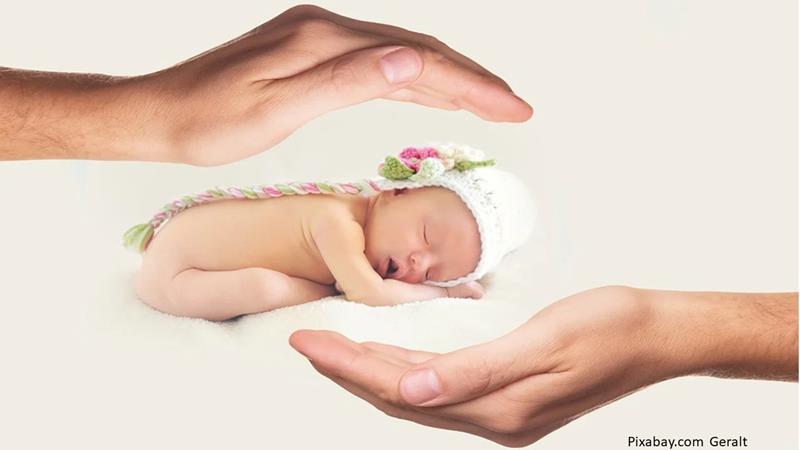 One of the lessons we should learn from the resurrection stories is that Jesus controls both his and our destinies. It’s not about us going out looking for God, it’s about God looking for us. There are no barriers that we can put up to avoid God. The disciples discovered this when Jesus pops in. This is good news for those of us sheltering and avoiding contact with others in order to stay healthy during this pandemic. While we might not be able to go to church on Sunday mornings, God can invade the privacy of our homes. We can’t keep God out. As Jesus shows us, God is in control. That’s good, because we can screw things up, so we’re a lot better off depending upon the God who surprises us, than depending on our own inability to bring us back into a relationship with the Almighty. This is what the Presbyterian doctrine of election or predestination is all about.
One of the lessons we should learn from the resurrection stories is that Jesus controls both his and our destinies. It’s not about us going out looking for God, it’s about God looking for us. There are no barriers that we can put up to avoid God. The disciples discovered this when Jesus pops in. This is good news for those of us sheltering and avoiding contact with others in order to stay healthy during this pandemic. While we might not be able to go to church on Sunday mornings, God can invade the privacy of our homes. We can’t keep God out. As Jesus shows us, God is in control. That’s good, because we can screw things up, so we’re a lot better off depending upon the God who surprises us, than depending on our own inability to bring us back into a relationship with the Almighty. This is what the Presbyterian doctrine of election or predestination is all about. But before the disciples can understand this, they must realize who this is that has invaded their meeting. In their mind, Jesus is dead. You don’t come back to this life once grasp the idea that he is risen. First, he asks for a bite to eat. It’s been a while since his last supper. It’s important that they see food going in his mouth (see food, seafood, get it?). Jesus then points to his flesh and bones. Luke wants to assure us that Jesus’ appearance to the disciples after his death isn’t just wishful thinking on their part.
But before the disciples can understand this, they must realize who this is that has invaded their meeting. In their mind, Jesus is dead. You don’t come back to this life once grasp the idea that he is risen. First, he asks for a bite to eat. It’s been a while since his last supper. It’s important that they see food going in his mouth (see food, seafood, get it?). Jesus then points to his flesh and bones. Luke wants to assure us that Jesus’ appearance to the disciples after his death isn’t just wishful thinking on their part.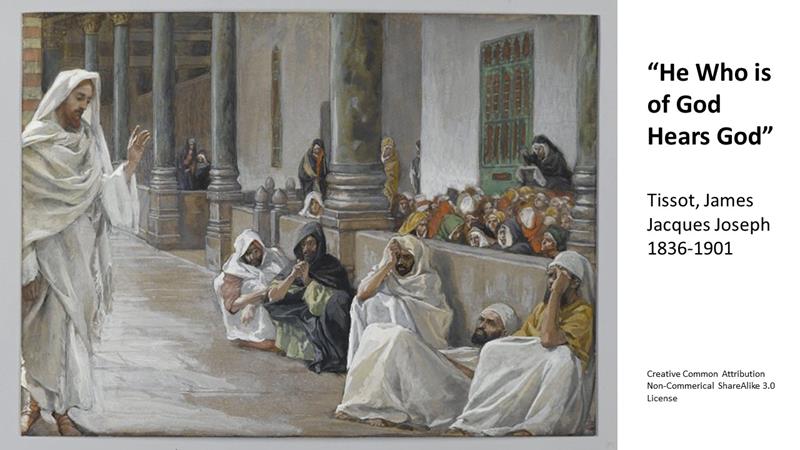 The second thing Jesus does, which is like what he did with those in Emmaus, is to help the disciples understand the scriptures. Jesus wants them to grasp the idea that his suffering, death, and resurrection has been God’s plan.
The second thing Jesus does, which is like what he did with those in Emmaus, is to help the disciples understand the scriptures. Jesus wants them to grasp the idea that his suffering, death, and resurrection has been God’s plan. Of course, because this is God’s doing, not the disciples’, they will need to be given the strength and ability to carry this mission out. Jesus, in his commission to the disciples in Luke’s gospel, is looking forward to the: coming of the Holy Spirit, to Pentecost, after which the disciples will take Jesus’ message to the end of the world.
Of course, because this is God’s doing, not the disciples’, they will need to be given the strength and ability to carry this mission out. Jesus, in his commission to the disciples in Luke’s gospel, is looking forward to the: coming of the Holy Spirit, to Pentecost, after which the disciples will take Jesus’ message to the end of the world. Jesus shows up and calls us because, sooner or later, we are no longer going to be hiding in our home. Life will open back up and when that happens, we need to be ready (just as the disciples were ready on Pentecost) to go into the world and make a difference. Think of this time we’re in as a Sabbath. Like the disciples, we rest today. In a short while, there will be plenty for us to do. As followers of Jesus, we’re to change the world, to make it a kinder more generous and gracious, home. May we catch that vision and live into it. Amen.
Jesus shows up and calls us because, sooner or later, we are no longer going to be hiding in our home. Life will open back up and when that happens, we need to be ready (just as the disciples were ready on Pentecost) to go into the world and make a difference. Think of this time we’re in as a Sabbath. Like the disciples, we rest today. In a short while, there will be plenty for us to do. As followers of Jesus, we’re to change the world, to make it a kinder more generous and gracious, home. May we catch that vision and live into it. Amen.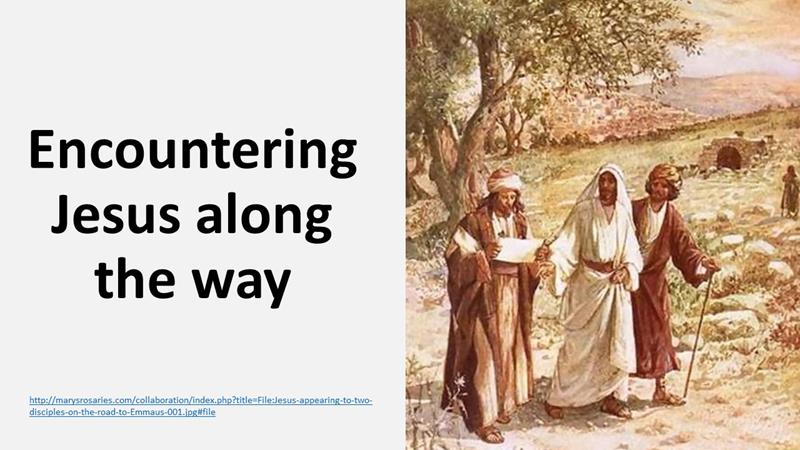
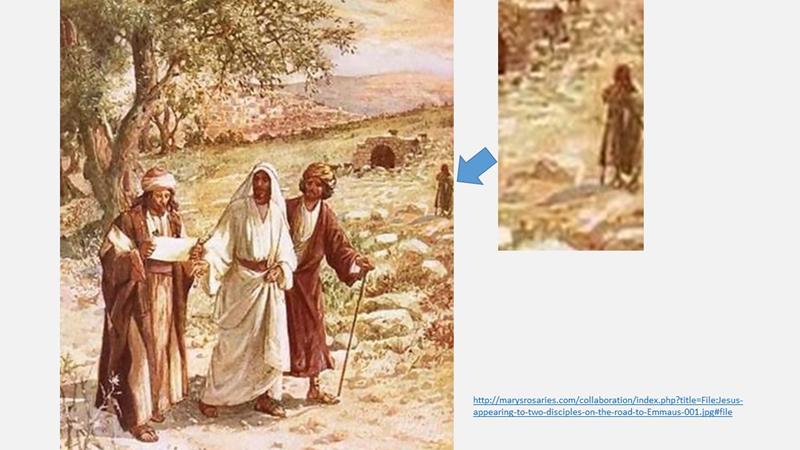 I have a lot of time to think out here, watching the sheep. I see a lot of people coming and going. Jerusalem, the Holy City, is just over the rise, a few miles away. These three were heading away from the city and engaged in a great debate. Even with my back turned, I could hear them a mile away. And as they were talking, the third guy, the one in a white robe, catches up with them. He joins their conversation. They seem rather surprised that he didn’t know what they were talking about. There’s this man, supposedly a king, who’d been crucified. But then he starts asking questions and I can tell they are intrigued. Here, a guy who didn’t seem to know the news, yet knows the scriptures.
I have a lot of time to think out here, watching the sheep. I see a lot of people coming and going. Jerusalem, the Holy City, is just over the rise, a few miles away. These three were heading away from the city and engaged in a great debate. Even with my back turned, I could hear them a mile away. And as they were talking, the third guy, the one in a white robe, catches up with them. He joins their conversation. They seem rather surprised that he didn’t know what they were talking about. There’s this man, supposedly a king, who’d been crucified. But then he starts asking questions and I can tell they are intrigued. Here, a guy who didn’t seem to know the news, yet knows the scriptures. 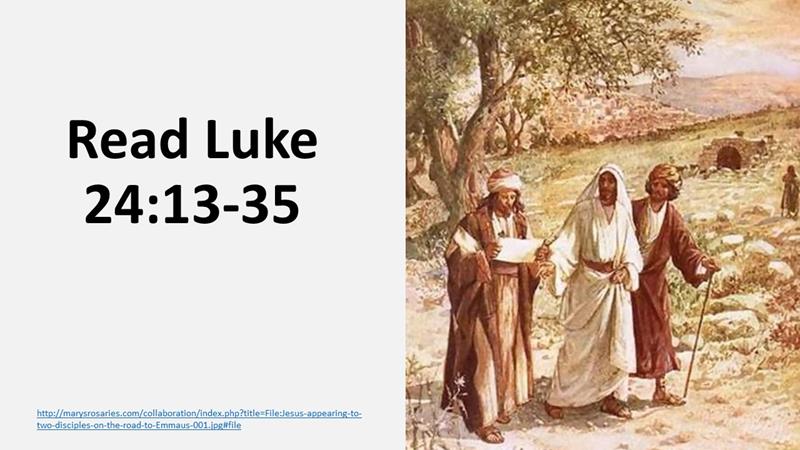
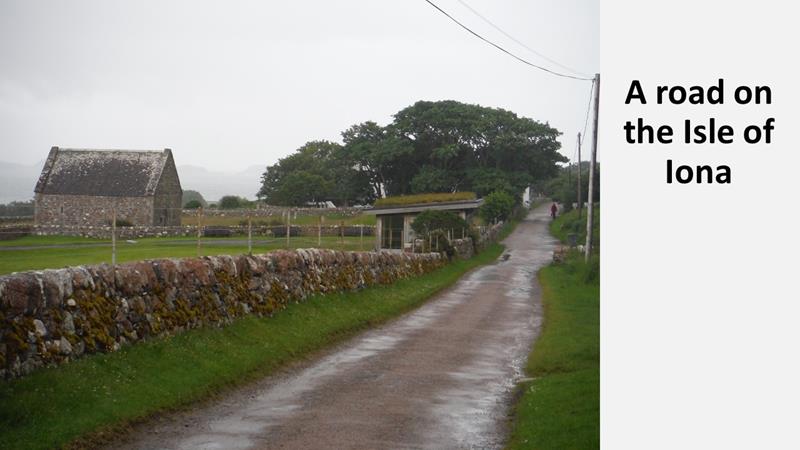
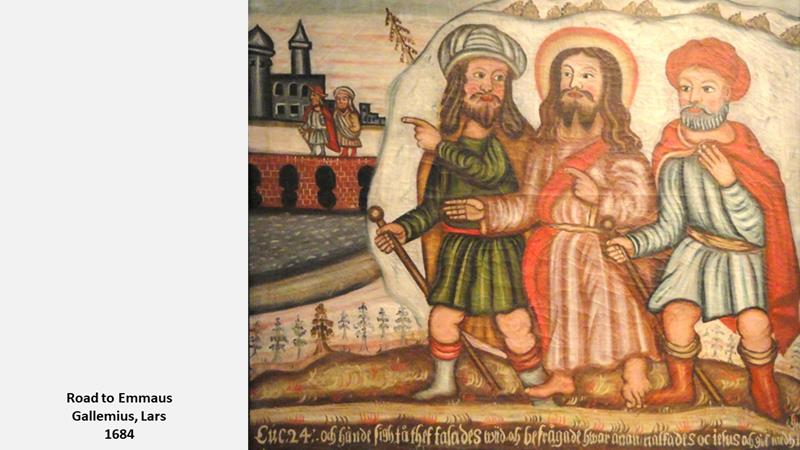 On this occasion, they are walking and discussing the events of the past few days when they are joined by a stranger. This makes sense to me, as I have walked a lot in my life. I recall numerous occasions along the Appalachian Trail where I was talking to someone and a third person comes up behind us and, overhearing what we were talking about, puts his two cents worth.
On this occasion, they are walking and discussing the events of the past few days when they are joined by a stranger. This makes sense to me, as I have walked a lot in my life. I recall numerous occasions along the Appalachian Trail where I was talking to someone and a third person comes up behind us and, overhearing what we were talking about, puts his two cents worth.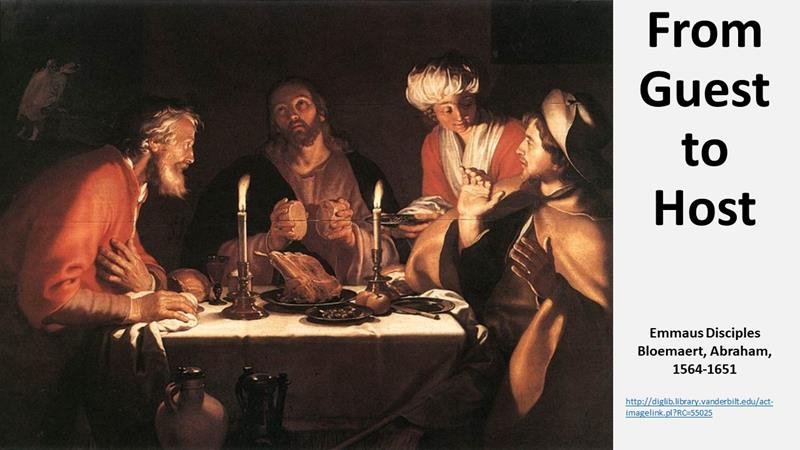 Something else happens. Jesus, at the table, goes from being the guest to the host.
Something else happens. Jesus, at the table, goes from being the guest to the host.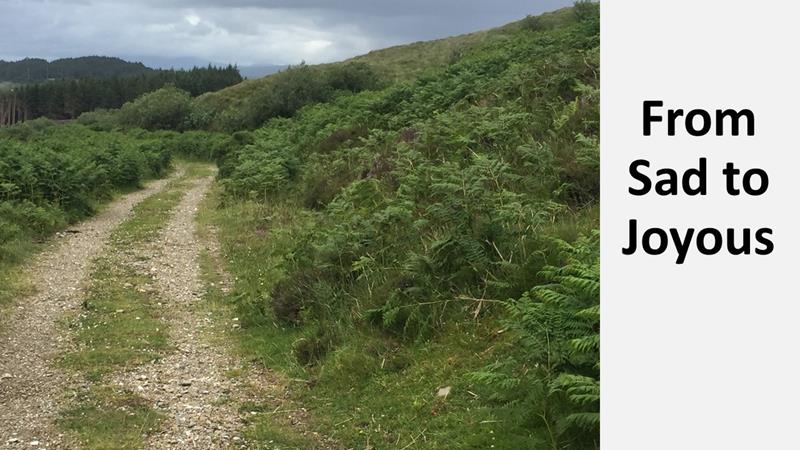
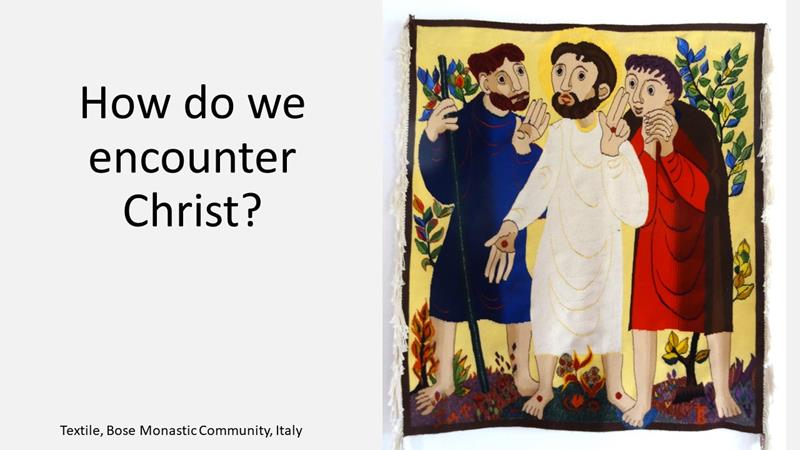 In some ways, our encounters with Christ are probably more like these two disciples walking to Emmaus. There are very few Damascus Road experiences, like that of Paul. It ranks up there with Moses’ burning unburned bush. Most of us experience Christ, like these two, when we realize something someone said caused our hearts to burn, or when someone opens Scripture and we learned the eternal truths of God’s Word. And when something like that happens, we must tell someone. It’s a Truth we can’t keep to ourselves. This is how our faith spreads. We encounter Christ through his word or through someone who speaks to us about Christ and then Christ becomes real to us.
In some ways, our encounters with Christ are probably more like these two disciples walking to Emmaus. There are very few Damascus Road experiences, like that of Paul. It ranks up there with Moses’ burning unburned bush. Most of us experience Christ, like these two, when we realize something someone said caused our hearts to burn, or when someone opens Scripture and we learned the eternal truths of God’s Word. And when something like that happens, we must tell someone. It’s a Truth we can’t keep to ourselves. This is how our faith spreads. We encounter Christ through his word or through someone who speaks to us about Christ and then Christ becomes real to us.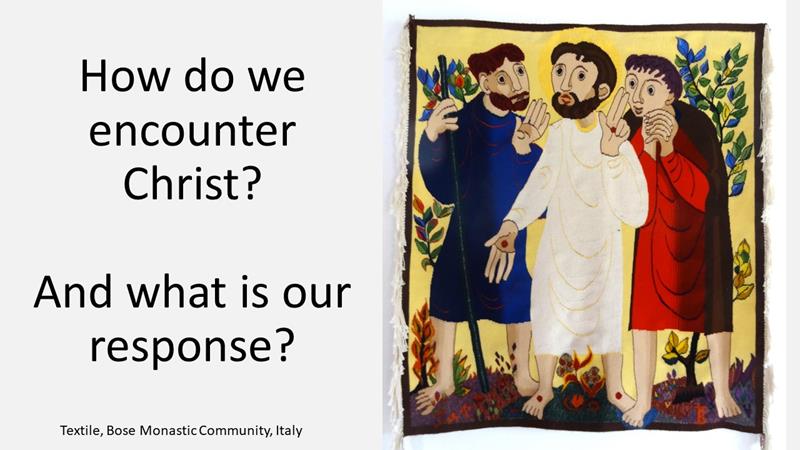

 Earlier in the first chapter of Luke’s gospel, the angel Gabriel met Mary in Nazareth to give her the good news. However, I’m not sure that everyone saw this as good news. I am not even sure Mary saw it that way. After all, she was just a young woman. Tradition has it she was only 14 years old, and here’s this angel is talking about all of what this child she’s to carry will do. Mary wonders how it’s to happen and told that the Holy Spirit will fill her, and she’ll conceive. In addition, she’s told that her relative, the old barren Elizabeth, is also pregnant and will bear a son. God appears to be active with the oldest and the youngest.
Earlier in the first chapter of Luke’s gospel, the angel Gabriel met Mary in Nazareth to give her the good news. However, I’m not sure that everyone saw this as good news. I am not even sure Mary saw it that way. After all, she was just a young woman. Tradition has it she was only 14 years old, and here’s this angel is talking about all of what this child she’s to carry will do. Mary wonders how it’s to happen and told that the Holy Spirit will fill her, and she’ll conceive. In addition, she’s told that her relative, the old barren Elizabeth, is also pregnant and will bear a son. God appears to be active with the oldest and the youngest. “Girl, how’d you get yourself in this mess?” isn’t how Elizabeth greets Mary. Instead, she starts out praising Mary, wondering what she, Elizabeth, has done to deserve such a visit. She proclaims Mary as the most blessed of all women. Mary breaks out in song. She didn’t sing to Gabriel, at the heavenly encounter she had earlier. She sings when another person, one whom must have known as a kind older woman, confirms her status.
“Girl, how’d you get yourself in this mess?” isn’t how Elizabeth greets Mary. Instead, she starts out praising Mary, wondering what she, Elizabeth, has done to deserve such a visit. She proclaims Mary as the most blessed of all women. Mary breaks out in song. She didn’t sing to Gabriel, at the heavenly encounter she had earlier. She sings when another person, one whom must have known as a kind older woman, confirms her status. Mary is joyous, but not in the manner we think of joy. For us, joy is a child experiencing an ice cream cone for the first time or us witnessing the child’s wonder. Joy is a mother watching her son make a home run as a Little Leaguer. Joy is laugher at a good joke, the awe of a beautiful sunset without sand gnats, sitting around a fire telling stories when it’s not too cold, or the Pirates winning the World Series. All these things are great, but is this what joy really is? Or is it something deeper.
Mary is joyous, but not in the manner we think of joy. For us, joy is a child experiencing an ice cream cone for the first time or us witnessing the child’s wonder. Joy is a mother watching her son make a home run as a Little Leaguer. Joy is laugher at a good joke, the awe of a beautiful sunset without sand gnats, sitting around a fire telling stories when it’s not too cold, or the Pirates winning the World Series. All these things are great, but is this what joy really is? Or is it something deeper. When Jesus was at table with his disciples on the night before his crucifixion, he instructs his disciples and then says he’s telling them all this so that his joy will be in them, and that their joy will be complete.
When Jesus was at table with his disciples on the night before his crucifixion, he instructs his disciples and then says he’s telling them all this so that his joy will be in them, and that their joy will be complete. When Paul writes from prison to the Philippians, he tells them how he’s joyous when he prays for them and asks them to make his joy complete by being of the mind as Christ.
When Paul writes from prison to the Philippians, he tells them how he’s joyous when he prays for them and asks them to make his joy complete by being of the mind as Christ. This is unabashed joy; joy regardless of the situation. All is not well in the world, then or now, but we as believers are called to see beyond the present and to have faith in what God’s doing. We are called to be joyous and to have hope and to share our hope with others. In the long arch of history the impeachment of a President, a rogue nation like North Korea having rockets and weapons of mass destruction, and the eruption of a volcano in New Zealand (or heaven help us, if one blew up in Bluffton) isn’t the final word. For we believe God has things under control and even if we screw everything up and blow the planet to smithereens, God will not let that be the final word.
This is unabashed joy; joy regardless of the situation. All is not well in the world, then or now, but we as believers are called to see beyond the present and to have faith in what God’s doing. We are called to be joyous and to have hope and to share our hope with others. In the long arch of history the impeachment of a President, a rogue nation like North Korea having rockets and weapons of mass destruction, and the eruption of a volcano in New Zealand (or heaven help us, if one blew up in Bluffton) isn’t the final word. For we believe God has things under control and even if we screw everything up and blow the planet to smithereens, God will not let that be the final word. So, we go back to that young woman, pregnant and not yet married, in a world without social safety nets. You can’t be much more vulnerable than Mary, standing before Elizabeth. Yet she breaks out in this beautiful song that focuses on what God is doing. Mary doesn’t speak of what God is doing for her, personally, except for having chosen her. She’s not thankful for a new house, or car, or clothes or a servant. Her lot is not joyful by most definitions. She has this son that runs away at the age of 12.
So, we go back to that young woman, pregnant and not yet married, in a world without social safety nets. You can’t be much more vulnerable than Mary, standing before Elizabeth. Yet she breaks out in this beautiful song that focuses on what God is doing. Mary doesn’t speak of what God is doing for her, personally, except for having chosen her. She’s not thankful for a new house, or car, or clothes or a servant. Her lot is not joyful by most definitions. She has this son that runs away at the age of 12.



 At the end of the sixth grade at Bradley Creek Elementary School, there was a graduation banquet. It was held in the evening, which made it special, and in the cafeteria, which wasn’t so special. I’m sure we had macaroni and cheese. We always had mac and cheese. There must have been a rule that you couldn’t open the cafeteria without mac and cheese. But this was a special meal, so maybe there was a slice of ham or a piece of chicken and a piece of cake that was larger than the one inch cubes they fed us at lunch.
At the end of the sixth grade at Bradley Creek Elementary School, there was a graduation banquet. It was held in the evening, which made it special, and in the cafeteria, which wasn’t so special. I’m sure we had macaroni and cheese. We always had mac and cheese. There must have been a rule that you couldn’t open the cafeteria without mac and cheese. But this was a special meal, so maybe there was a slice of ham or a piece of chicken and a piece of cake that was larger than the one inch cubes they fed us at lunch. In the bulletin, I titled this sermon “Humility and Hospitality.” The problem with coming up with a title a few weeks before writing a sermon is that you often have no idea where the sermon is heading. I later decided that a better title might be Banquet Etiquette. But as I continued to study and ponder, I decided to put a question mark at the end. Yes, Jesus expects us to be humble and not pretentious. Such advice will also keep us from being in an embarrassing position. Yes, on the surface, this is about etiquette. But is this what Jesus is driving? Is this Jesus’ attempt to be the Emily Post of the first century? Or is there a deeper message here?
In the bulletin, I titled this sermon “Humility and Hospitality.” The problem with coming up with a title a few weeks before writing a sermon is that you often have no idea where the sermon is heading. I later decided that a better title might be Banquet Etiquette. But as I continued to study and ponder, I decided to put a question mark at the end. Yes, Jesus expects us to be humble and not pretentious. Such advice will also keep us from being in an embarrassing position. Yes, on the surface, this is about etiquette. But is this what Jesus is driving? Is this Jesus’ attempt to be the Emily Post of the first century? Or is there a deeper message here? Remember what I said about the Sabbath, before reading this passage? That it was a foretaste of the eternal kingdom. And this section of Luke’s gospel is filled with parables that focus on the kingdom.
Remember what I said about the Sabbath, before reading this passage? That it was a foretaste of the eternal kingdom. And this section of Luke’s gospel is filled with parables that focus on the kingdom. The surface meaning may have to do with avoiding embarrassment. A deeper meaning might be that we should humble ourselves. One of the challenges that Jesus had was his disciples wanting to grab key positions in the coming kingdom.
The surface meaning may have to do with avoiding embarrassment. A deeper meaning might be that we should humble ourselves. One of the challenges that Jesus had was his disciples wanting to grab key positions in the coming kingdom. But there is another way to look at this parable, which I had not considered until I read a blog post by a pastor in Iowa earlier this week.
But there is another way to look at this parable, which I had not considered until I read a blog post by a pastor in Iowa earlier this week.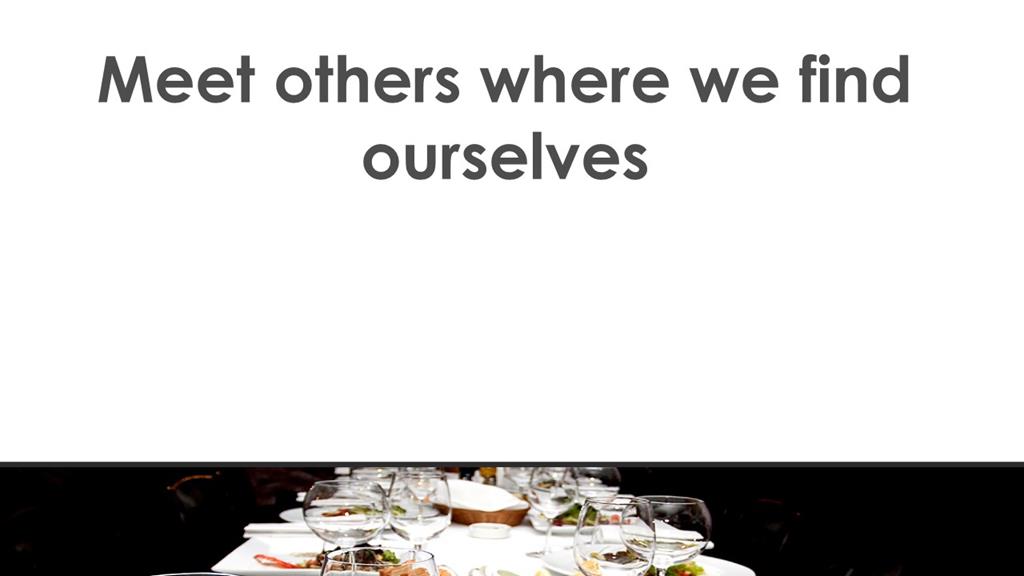 Instead of Jesus wanting us to show humility in the hopes that we might be called up to the head table (as you could read this passage), maybe Jesus is telling us to meet others where we find ourselves. Show hospitality to those less fortunate. If our only goal was to sit at the head table, we could easily display false humility to gain such a blessing.
Instead of Jesus wanting us to show humility in the hopes that we might be called up to the head table (as you could read this passage), maybe Jesus is telling us to meet others where we find ourselves. Show hospitality to those less fortunate. If our only goal was to sit at the head table, we could easily display false humility to gain such a blessing.  But Jesus wants us to long for the kingdom, which isn’t going to be made up of exclusively of those who look, and act like us. Jesus’ vision is for a world where believers cherish their friendship and fellowship with all people. It’s about us showing goodness to those who have no way to repay us for what we can do for them. Ponder what this kind of world might look like.
But Jesus wants us to long for the kingdom, which isn’t going to be made up of exclusively of those who look, and act like us. Jesus’ vision is for a world where believers cherish their friendship and fellowship with all people. It’s about us showing goodness to those who have no way to repay us for what we can do for them. Ponder what this kind of world might look like. You know, none of us know what this week will bring as Dorian churns up the waters. When Hurricane Matthew hit in 2016, I spent a few days in Dublin, GA. There’s a great hot dog shop there, not far from the courthouse, where I found myself drawn at lunchtime. There were the regulars, but there was also those of us in exile: from Savannah, from Hilton Head, from Brunswick and Saint Simons. The place was packed. Friendships were made as we were forced to share tables. Stories were told of shared experiences such as being in gridlock on the highway. There was a lot laughter. I image that’s how the kingdom will be. So, if we evacuate this week, and you find yourself in a strange land for a few days, don’t see it as a burden. Instead, take it as an opportunity to sample the kingdom. That’s what Jesus would have you do. Let us pray:
You know, none of us know what this week will bring as Dorian churns up the waters. When Hurricane Matthew hit in 2016, I spent a few days in Dublin, GA. There’s a great hot dog shop there, not far from the courthouse, where I found myself drawn at lunchtime. There were the regulars, but there was also those of us in exile: from Savannah, from Hilton Head, from Brunswick and Saint Simons. The place was packed. Friendships were made as we were forced to share tables. Stories were told of shared experiences such as being in gridlock on the highway. There was a lot laughter. I image that’s how the kingdom will be. So, if we evacuate this week, and you find yourself in a strange land for a few days, don’t see it as a burden. Instead, take it as an opportunity to sample the kingdom. That’s what Jesus would have you do. Let us pray: